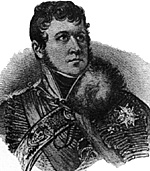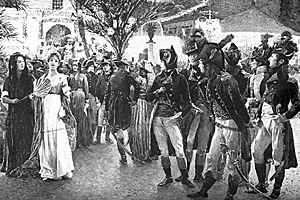In Italy in 1796, in a cavalry skirmish, Junot received a wound in the head [2] which would eventually have dire consequences. A General in the Egyptian campaign, he inflicted a severe defeat on the Turks at Nazareth in Syria in April,
1799. However, as he was to show later on, he was only a man of average ability and
was outshone by other generals like Murat and Mannont.
After being captured in October, 1799 by the Royal Navy, he was returned to France and went to Pans where he met Laure Permon, the daughter of Madame Permon, [3]
an old friend of Laetitia Bonaparte, later to be known as "Madame Mere." The Permons were far from prosperous and suffered financial difficulties. Laure was lucky. Helped by
her beautiful hair and teeth, she proved attractive to Junot, and she fell in love
with him in turn. At the time, he was Bonaparte's ADC. Bonaparte did his best to help his old companion and to give Laure a decent dowry. They were married on October 30, 1800.
The newlyweds had a good start. They were friends with the First Consul and participated in the entertainments at Malmaison. It appears that Bonaparte, who appreciated her quick repartee, and even had some kind of warm feelings for her, still had room for mistrust:
During the Consulate penod, Laure did not think about writing but, as was customary, found a spot for herself in Parisian society. Junot became commandant of Paris. She had a mansion
in Pans, rue des Champs Elysees, and a country house in Petit Bievre, where she lavishly entertained the prominent officers of state and the army, including Napoleon Bonaparte.
In 1804, Junot was sent to Arras to train troops for the projected invasion of England. But something better came up. In 1805, Napoleon send Junot as an ambassador to Portugal. Laure followed and was introduced to the Portuguese court, an extraordinary collection of extravagant and weird puppets, from the queen-mother, considered by many to be insane, to the regent who, according to Laure, looked and acted like an orangutan. Anyhow, in Portugal, Laure continued to spend money in order to create a high opinion of French women.
Junot was recalled to rejoin the army just in time for the Battle of Austerlitz. After repressing a revolt in Italy, he was made governor of Paris in July, 1806.
Then, in 1807, Junot had to depart for war. He took a reserve corps to occupy Portugal. By forced marches through difficult country he reached the Tagus at Abrantes and in November entered Lisbon unopposed, nearly capturing the Portuguese government. He was made Governor General of the country and, in April, 1808, duc d'Abrantes.
But from then on, nothing went well for Junot. On August 21, 1808, he lost Portugal in the Battle of Vimiero, failing with a small force to outflank the capable Wellesley. He secured good terms at Cintra and was repatriated to France with his army.
After the honeymoon and the first Portuguese interlude, the relationship between Laure and Junot was as good as could be expected, but if Laure was a faithful wife, Junot, like most of his fellow generals, was a womanizer and, starting with his campaign in Portugal in 1807, had
numerous adventures. [5]
His most resounding conquest was no less than Caroline Murat, [6] who, under the cover of passionate love, used the governor of Paris for her political
shams. Laure became aware of the affair and considered herself re1eased, looked, and, as a first step, found consolation with a ci-devant, witty Monsieur de Girardin. Monsieur de Girardin had several successors. This state of affairs continued without too many problems.
When, in 1807, Junot departed for Portugal, Laure remained in Paris and continued to entertain the cream of the Faubourg Saint-Germain and of Parisian society.
At right, Myrbach picture portrays Cairo's Tivoli Gardens in happier days of 1799. From left to right: Napoleon, Kleber, Eugene, Lasalle, and Junot.
It is perhaps for that reason that Monsieur de Metternich, the Austrian ambassador, eager to discover for himself the reaction of the aristocrats under close watch by the Emperor, decided to seduce Laure (1808).
He was a handsome man, very elegant, with a charming personality. Laure did not offer much resistance, but that new liaison had to endure scandals and dangers.
In 1809, Junot returned to Spain in command of the VIII Corps and later the III Corps but he was superseded in the conduct of the siege of Saragossa and sent back to Germany in June, 1809 to command the Reserve Army.
Mettenich was, always for political reasons rather than sentimental ones, the lover of Caroline Murat, and the latter, as the sister of the Master, could not accept giving way to the little Permon! So it was by her good offices that Junot, when he returned from Austria, was informed of his misfortune. He was given letters from Metternich to Laure and other proofs of
Laure's affair.
Junot summoned Metternich's wife, also called Laure, [7] to witness his revenge! In her presence, he threatened to kill his wife with shears, to
kill the Metternich children as well and to challenge her husband to a duel. You will be hanged for it, said Laure Metternich, and I shall meanwhile put my children under the
protection of the Emperor. The letters, she declared, were not in her husband's handwriting.
Junot had no right to be angry with his wife since his reputation as a womanizer was notorious and well established, but his head started to give him trouble and he started to
show some signs of insanity. In January, 1810, after a masked ball at the Tuileries, a violent argument developed and Junot, whose mind had started to deteriorate, struck his wife
with scissors. [8] Napoleon had been informed of the
situation with the Metternichs and the story had become the talk of Paris.
Laure forgot the whole affair and, some sources claim, that on the Emperor's order she followed Junot when he returned to Spain at the head of the VIII Corps.
In 1810, because of his deteriorating military reputation, [9] Junot was not given the command of the second army of Portugal but served under Massena, covering the siege of Ciudad Rodrigo and commanding the center at Bussaco.
On October 11th, he won the action at Sobral. He received a painful wound on the nose in October, 1811, at Rio Major.
In Spain, Laure was initiated into the horrors of war. Like the combatants, she suffered from the understandable national fanaticism, the hatred of the foreigner, and
exhaustion. Now five months pregnant (the result of their reconciliation), she
followed Junot from Valladolid to Salamanca where one day she was almost taken by the guerilleros of don Julian. It was at Ciudad Rodrigo, half in ruins, in a dilapidated house, that
Laure, the former mistress of the charming Metternich, gave birth to a son called Rodrigue.
Months went by and Junot continued on even as his mental problems inexorably progressed
toward complete insanity.
Aware of Junot's mental problems, the Emperor still tried to help him. In 1812, Junot went to Russia though he was not given the direct command of a corps but was instead assigned to serve under Eugene de Beauharnais. Then, he effectively commanded the II and IV Corps and later the VIII Corps in place of Jerome. At the Battle of Smolensk on August 10, 1812, he failed to do what Napoleon expected, and the army bulletin blamed Junot for "lack of firmness." He was denied the honor of entering Moscow. Falling into such disgrace did not help Junot's mental health.
In 1812, as the Russian Campaign was not for women, Laure did not follow her husband there and instead remained in Paris. She renewed her lavish entertainments and, as in 1810, that included receiving many former emigres and foreign visitors considered suspect by
Napoleon and Fouche.
Laure's activities did not stop with soirees. This time she met not an ambassador but a young, handsome, soldier- a twenty-three-year-old, blond, blue-eyed, noble cavalryman, Maurice
de Balincourt. Overcome with love, Laure said: Maurice, it's either you or death!....
Balincourt was a gentlemen and, of course, did not allow Laure to die....The Duchess's happiness remained untroubled even while, in Russia, her unfortunate husband was quickly
losing what little military reputation he had left. Now, Laure belonged entirely to Maurice and literally abandoned and ignored her husband, who was now completely adrift and was, step by
step, losing his mind as well. In spite of his infidelity and his attempt against her with the scissors, it is hard to justify Laure's complete lack of concern and gratitude toward that
poor demented man who had introduced her to society and had given her a financial security unknown to her before her marriage. That was also Napoleon's opinion. He had always been most generous to the Junots, and spoke of Laure as "la petite peste." He was so disgusted
with her that after her husband's death in 1813, he ordered her to stay out of Paris.
When, in 1813, Junot was sent to be governor of Illyria but his mind gave way. He was brought back to his father's house at Montbard and committed suicide on July 29th.
Return
After being ordered to stay twenty miles away from Paris, like Madame de Stael, Laure persuaded Savary, the minister of police, to let her return. Having intrigued on behalf of
the Bourbons, she was able to keep her way of life under the first Restoration
(1814), but after Waterloo, the second Restoration saw the collapse of her fortunes, since Louis the XVIIIth was much less generous than Napoleon. In addition, Laure, now over
thirty, was finally abandoned by the handsome Maurice.
So, in order to survive, she became a slave to writing. She wrote and wrote without respite. She spent much time in Rome until 1831, at which time she settled at the Abbaye-aux-Bois in Paris. There she completed her Memoires historiques sur Napoleon, la Revolution, le Consulat, l'Empire et la Restauration, (1831-35) which made her reputation. It was a malicious commentary on her contemporaries. She also wrote Histoires des salons de Paris (1836-38) and other works. She died in poverty in Paris on June 7, 1838.
[1] Andoche Junot (1771-1813) was born on Oct. 23, 1771, at Bussy-le-Grand in Burgundy, the son of a rich farmer who gave him a good education. Junot
joined the volunteers of the Cote-d'Or in 1792. He was a sergeant at Toulon.
Chandler, David, Dictionary of the Napoleonic Wars MacMillan, New York, 1979.
This article appears in MagWeb (Magazine Web) on the Internet World Wide Web. One of Napoleon's companions in Egypt was Junot. [1] His friendship with Junot went back to the siege of Toulon when Bonaparte asked for a man to write his notes on a reconnaissance: Sergeant Junot was given to him and, well-educated, did a good job. On January 17, 1794 he was promoted to captain and made aide-de-camp to Bonaparte. Together for the next two years, they shared money from Junot's father when they had nothing else.
One of Napoleon's companions in Egypt was Junot. [1] His friendship with Junot went back to the siege of Toulon when Bonaparte asked for a man to write his notes on a reconnaissance: Sergeant Junot was given to him and, well-educated, did a good job. On January 17, 1794 he was promoted to captain and made aide-de-camp to Bonaparte. Together for the next two years, they shared money from Junot's father when they had nothing else.
 Madame Junot, he told her, now that you are part of my Staff's family, I hope that you will listen to my advice. Remember that you must see everything, hear everything and forget
everything. Laure saw, heard, but forgot nothing. [4]
Madame Junot, he told her, now that you are part of my Staff's family, I hope that you will listen to my advice. Remember that you must see everything, hear everything and forget
everything. Laure saw, heard, but forgot nothing. [4]
 Seduction
Seduction
Footnotes
[2] It was one of several wounds which gravely affected him later on.
[3] Laure Permon (1784-1838), the future Duchess of Abrantes, was born in Montpellier on November 6, 1784. The family claimed to be the descendants of the Comnenes, the Byzantine emperors who had emigrated from Turkey to the mountains of Corsica, where Laure's mother became the close friend of Laetitia Bonaparte, mother of Napoleon. The move to Corsica did not bring fortune to the Permons. Then Madame Permon moved to Paris, where she scraped out a living from the dive she owned on rue Sainte-Croix.
[4] Her memoirs are a little muddy but, taking everything into consideration, give an exact account of the ambience and life during the
Empire.
[5] During the Campaign of Portugal, he credited himself with the conquest of Madame Trousset, the wife of an ordnance officer, and
Madame Foy, a remarkable horsewoman who liked to parade in front of the troops with the general. The army humorously commented, Junot Trousset Foy, which is a phonetic wordplay on Trousset (troussait means tumble) and can be translated as Junot Tumbled Foy.
[6] Caroline Murat was Napoleon's sister.
[7] Metternich was married 1795 to Eleonora (Laure) von Kautnitz, granddaughter of the Austrian statesman Wenzel von Kautnitz. She was deeply in love with her husband and brought him great estates and admission to the highest court circles.
The Metternichs had four children. Metternich had reasons to thank Laure for her cool handling of the situation with Junot.
[8] Here we have to rely on Laure Junot's account in her memoirs of that grave accident. Did it take place?
[9] There is little doubt that the deterioration of Junot's military reputation was the result of his increasing mental problems which finally led to complete insanity in 1813, and undoubtedly were a consequence of the bad head wounds he suffered during his military career.
Sources:
Junot, Laure, Memoires Historiques, etc., Paris, 1835.
Lucas-Breton, J., Soldats de Napoleon, Tallandier, Paris, 1977.
Malo, H., La Duchesse d'Abrantes au temps des Amours Paris, date unknown. McGuigan,
Dorothy Gies Metternich and the Duchess, Doubleday, New York, 1975.
Back to Empire, Eagles, & Lions Table of Contents Vol. 2 No. 9
Back to EEL List of Issues
Back to MagWeb Master Magazine List
© Copyright 1994 by Emperor's Headquarters
Other military history articles and gaming articles are available at http://www.magweb.com
